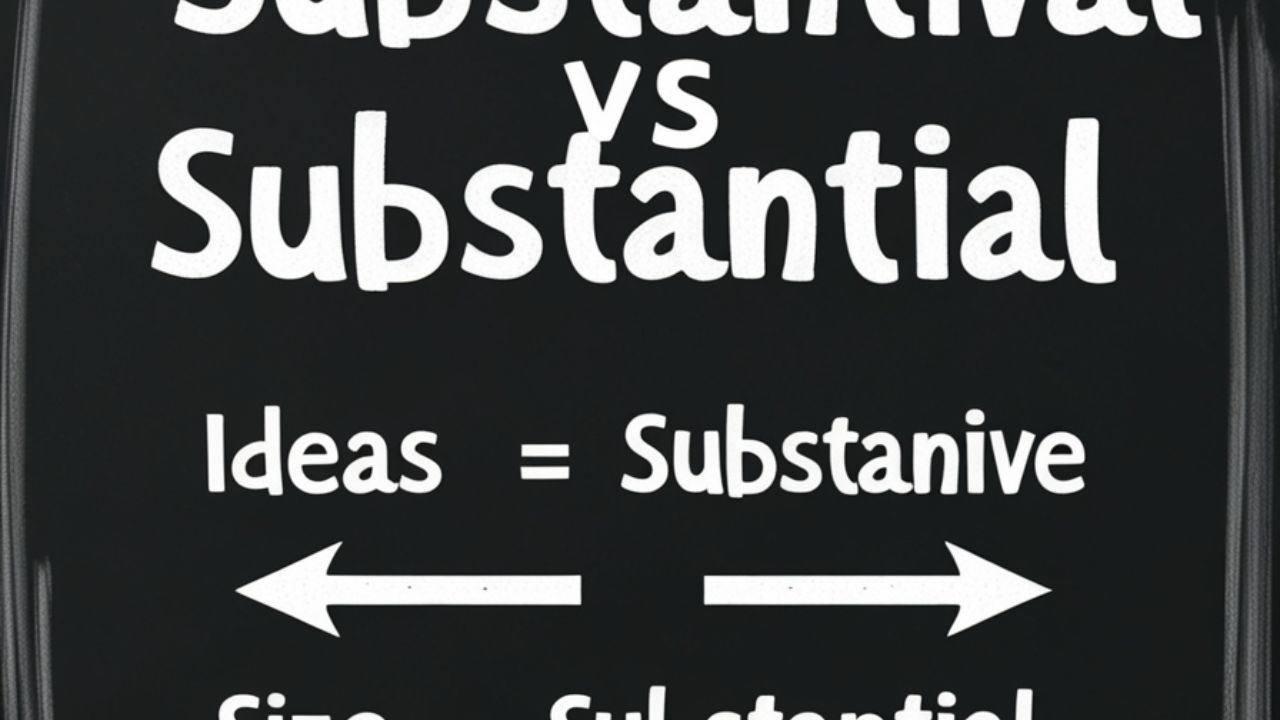The word substantial usually describes something big, strong, or important in amount. People use it when they talk about money, progress, or even buildings. It shows that something can be measured or felt in a clear and practical way.
On the other hand, substantive talks about the real meaning or deep value of something. It is often used in school work, law, or business. It helps explain ideas, rules, or changes that are serious and filled with importance.
The two words look alike, but their uses are not the same. Substantial points to size or weight, while substantive points to content or truth. Knowing the difference makes speaking and writing more clear, smart, and respectful.
Why Word Choice Between “Substantive” and “Substantial” Matters
Using the word substantial in the right place gives writing strength and clarity. It shows when something is large, serious, or important. A writer who chooses carefully sounds more confident and avoids mistakes that can confuse the reader.
The word substantive helps explain meaning, value, or content in a strong way. It is useful in school, law, and business. Good word choice builds trust, makes writing professional, and helps ideas shine with accuracy and respect.
- Using the right word avoids confusion and keeps the message clear.
- Correct choice builds trust and shows professionalism in writing.
- It helps readers understand whether something is about size or meaning.
- Proper usage improves the tone of business, legal, and academic work.
- Careful word selection strengthens communication and makes ideas more effective.
Etymology of Substantive and Substantial
| Word | Language of Origin | First Use (English) | Core Meaning |
| Substantive | Latin: substantivus | 14th century | Independent existence; essential meaning |
| Substantial | Latin: substantialis | 14th century | Considerable in quantity or size |
The word substantive comes from old Latin. It was used many centuries ago to show the idea of being real or having true meaning. Over time, it became common in grammar, law, and studies where ideas and rights needed strong description.
The word substantial also began in Latin. It was linked with things that are large, important, or heavy in size. People started using it for money, progress, and strength. This history shows how each word grew into its own clear use.
See also : Traveling vs Travelling: Which Spelling Is Correct?
What Does “Substantial” Mean?
The word substantial is used when something is big, strong, or serious in amount. It often explains money, growth, or progress. Writers use it to show that something can be counted, measured, or felt in a clear way.
In daily life, substantial can describe heavy food, strong houses, or important gains. It is also common in law, finance, and study reports. This word gives writing a clear tone and helps readers understand size, value, or importance without confusion.
Primary meanings:
- Substantial means large in size, amount, or value.
- Substantial can also mean strong, solid, or lasting.
- Substantive refers to real meaning or deep importance.
- Substantive often shows serious content in law, policy, or studies.
- Both words come from the idea of having substance but differ in use.
Examples in real-world usage:
- The company gained a substantial profit after launching a new product.
- The teacher praised the student for making substantial progress in reading.
- The meeting led to a substantive discussion about school rules.
- The new law brought a substantive change to workers’ rights.
- The judge required substantial evidence before making a final decision.
Common industries using “substantial”:
| Industry | Example Usage |
| Finance | Substantial gains, substantial losses |
| Law | Substantial evidence, substantial harm |
| Engineering | Substantial load capacity, substantial build |
| Education | Substantial improvement in test scores |
What Does “Substantive” Mean?

The word substantive is used when something has true meaning or real value. It is often found in law, school work, or business writing. It explains ideas, rights, or changes that are deep, serious, and important for understanding.
Writers use substantive to show strong points in arguments, policies, or studies. It gives weight to discussions and helps people focus on the content itself. This makes communication clear, professional, and respectful, showing that the subject has importance beyond simple words.
Primary meanings:
- Substantial shows something big in size, amount, or importance.
- Substantial can also mean strong, firm, or solid.
- Substantive means something with real meaning or value.
- Substantive is used for serious ideas, rights, or arguments.
- Both words link to substance but carry different uses.
Examples in sentences:
- The school received a substantial donation for building a new library.
- She made substantial progress in learning English this year.
- The lawyer gave a substantive argument during the trial.
- The teacher led a substantive discussion on climate change.
- The policy brought substantive improvements to public health.
Common domains using “substantive”:
| Field | Typical Context |
| Law | Substantive law (vs. procedural law) |
| Policy | Substantive reform, substantive rights |
| Academia | Substantive content, substantive argument |
| HR/Workplace | Substantive roles, substantive changes |
Side-by-Side Comparison of Substantive vs. Substantial
| Comparison Point | Substantial | Substantive |
| Refers to | Size, degree, importance | Meaning, content, relevance |
| Tangibility | Usually tangible/measurable | Often abstract/conceptual |
| Common in | Finance, construction, law | Law, academia, politics, policy |
| Example Phrase | Substantial evidence | Substantive argument |
| Memory Hook | “Substantial = measurable” | “Substantive = meaningful” |
Real-Life Case Study: Corporate Communication
In one company, leaders spoke of substantial changes when talking about employee feelings. The message sounded unclear because feelings cannot be measured. The team later chose better words to explain that the updates were meaningful and focused on the real needs of workers.
A second report showed profits and used the word substantial in the correct way. At the same time, policy notes spoke of substantive reforms, which gave the message depth. This balance made the communication professional, accurate, and easy for everyone to trust.
See also : To Many vs Too Many: Grammar Rules & Real Examples
The Legal Distinction Between Substantive and Substantial
Legal language relies on precise definitions, and these two words appear often – but with non-overlapping meanings.
Substantive Law vs. Procedural Law
| Legal Term | Meaning |
| Substantive law | Law that defines rights and duties |
| Substantial evidence | Enough proof to justify a legal decision |
- Substantive law defines rights and duties, like property rights or freedom of speech.
- Substantive law explains what is legal or illegal in daily life.
- Procedural law tells how courts carry out justice step by step.
- Procedural law covers rules for trials, appeals, and evidence handling.
- Together, substantive shows the “what,” and procedural shows the “how” of law.
Substantial Evidence in Legal Settings
- Substantial evidence means enough proof to support a legal decision.
- It does not need to be perfect but must be strong and reliable.
- Courts use it to decide if a claim or case can move forward.
- Examples include documents, witness statements, or financial records.
- Judges rely on substantial evidence to ensure fair and lawful outcomes.
When Context Shapes Meaning
- The word substantial fits when talking about size, growth, or measurable progress.
- The word substantive fits when describing depth, value, or importance of ideas.
- Using the wrong term can change the whole meaning of a sentence.
- Context decides if the focus is on quantity or meaningful content.
- Clear context helps readers understand messages without confusion or doubt.
Common Misuses and How to Avoid Them
| Incorrect Usage | Why It’s Wrong | Corrected Version |
| “She presented substantial insights.” | Insights are conceptual, not quantifiable | “She presented substantive insights.” |
| “The team made substantive profits.” | Profits are measurable | “The team made substantial profits.” |
| “We saw a substantive increase in growth.” | Increase is measurable | “We saw a substantial increase in growth.” |
Quick-Reference Guide for Writers and Professionals
- Use substantial for money, growth, profits, or measurable results.
- Use substantive for ideas, rights, reforms, or meaningful discussions.
- Substantial points to size, strength, or importance you can count.
- Substantive highlights depth, value, or serious content.
- Always check if the subject is measurable or meaningful before choosing.
Professional Writing Tip: Don’t Rely Solely on Spellcheck

Tools like spellcheck may miss the difference between substantive and substantial. Both words are spelled correctly, but their meanings are not the same. A careful writer needs to look at the context and choose the right word for clear and accurate writing.
Good communication depends on more than spelling. When you know how to use substantive and substantial correctly, your work becomes professional and easy to trust. Strong word choice shows skill, builds respect, and helps every message deliver the right meaning.
Why the Distinction Reflects Strong Writing
Writers who use substantive and substantial correctly show real skill in language. This choice improves clarity and avoids confusion. Careful word use gives writing more power, helping the reader understand ideas with respect, accuracy, and confidence in every line.
Strong writing depends on precision. Using substantive for meaning and substantial for measurable things reflects care and knowledge. It also makes documents, reports, and studies sound professional. Clear word choice builds trust and makes communication stand out as thoughtful and correct.
Final Thoughts
The words substantive and substantial may look alike, but they carry different meanings. One points to depth and value, while the other points to size and measure. Knowing when to use each word makes writing clear and strong.
Good language choice builds confidence and trust. Using substantive for meaningful ideas and substantial for measurable results shows care in communication. This small distinction improves writing, supports professionalism, and helps every message reach readers with accuracy and respect.
FAQs
Is it substantial or substantive changes?
“Substantial” means large or significant in amount, while “substantive” means meaningful or important in essence. Both are correct, depending on context and intended focus.
What is another word for substantive?
Another word for “substantive” is meaningful, but it can also be replaced with terms like essential, important, weighty, or significant, depending on context.
How to use the word substantive?
You can say, “The lawyer presented a substantive argument.” Here, it means the argument was strong, meaningful, and carried real importance or depth.
Is it better to write substantively?
Yes, writing substantively means focusing on depth, clarity, and value. It helps deliver stronger points, making communication clearer, professional, and more persuasive.

Join Bibcia on a journey to master English grammar. Discover easy lessons, writing tips, and practical examples designed to make learning grammar simple and effective.










